Unit4 Don’t eat in class Section A 1a-2d 课件(共49张PPT无音视频)
文档属性
| 名称 | Unit4 Don’t eat in class Section A 1a-2d 课件(共49张PPT无音视频) | 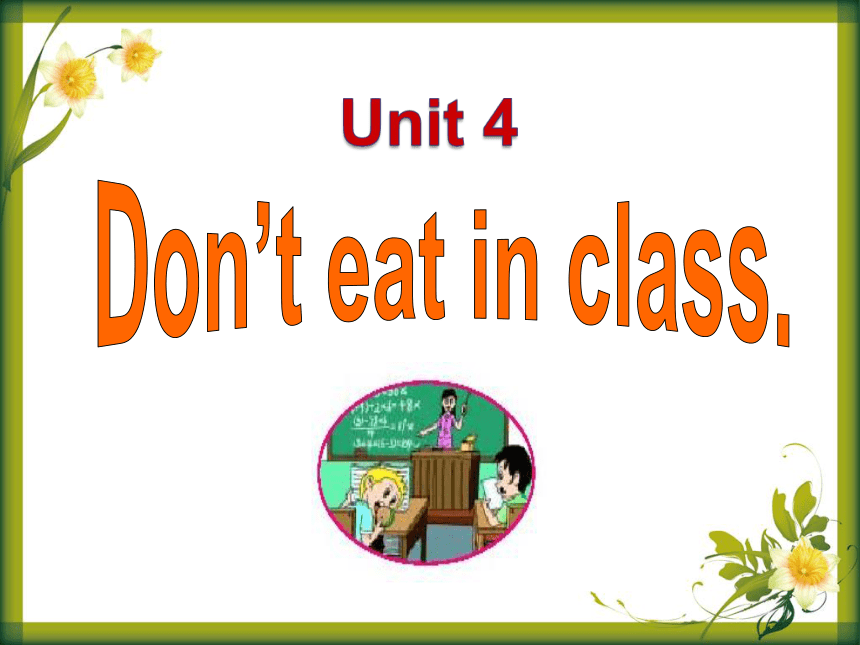 | |
| 格式 | zip | ||
| 文件大小 | 13.8MB | ||
| 资源类型 | 教案 | ||
| 版本资源 | 人教新目标(Go for it)版 | ||
| 科目 | 英语 | ||
| 更新时间 | 2019-04-03 19:59:45 | ||
图片预览

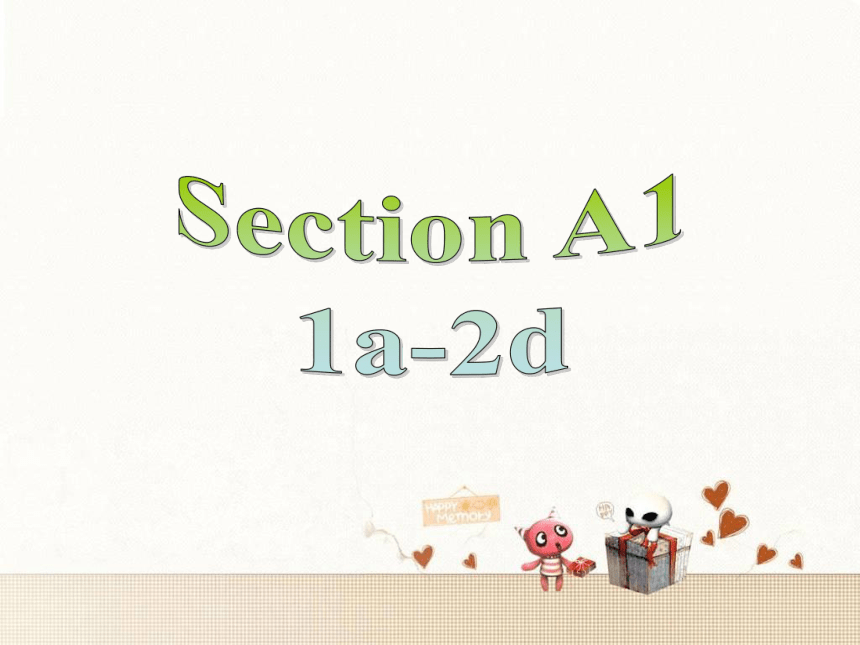
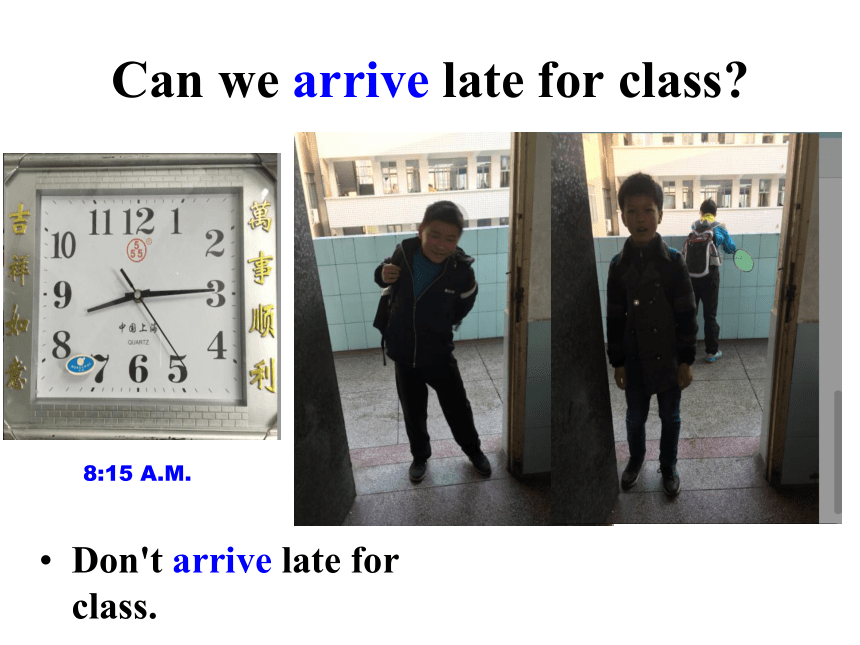
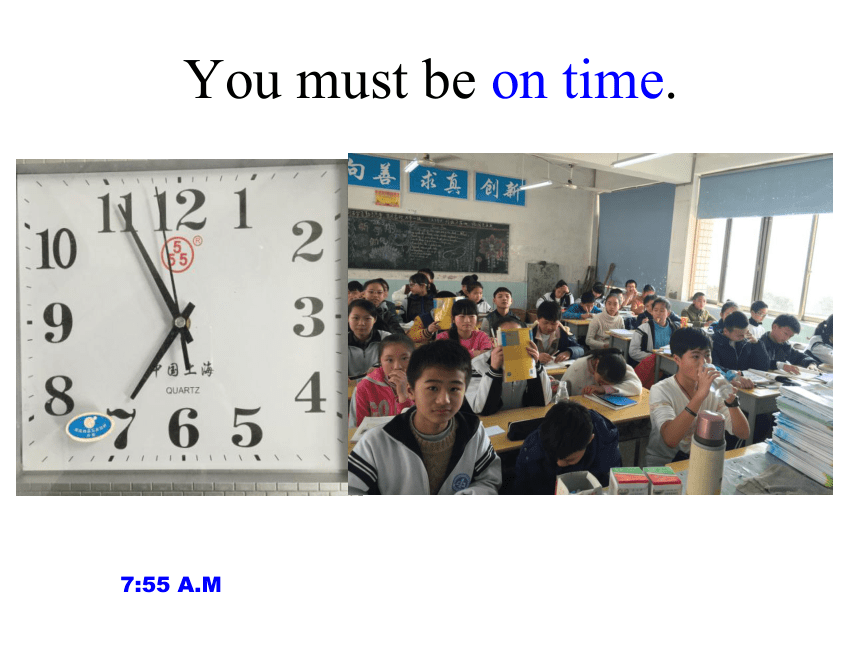
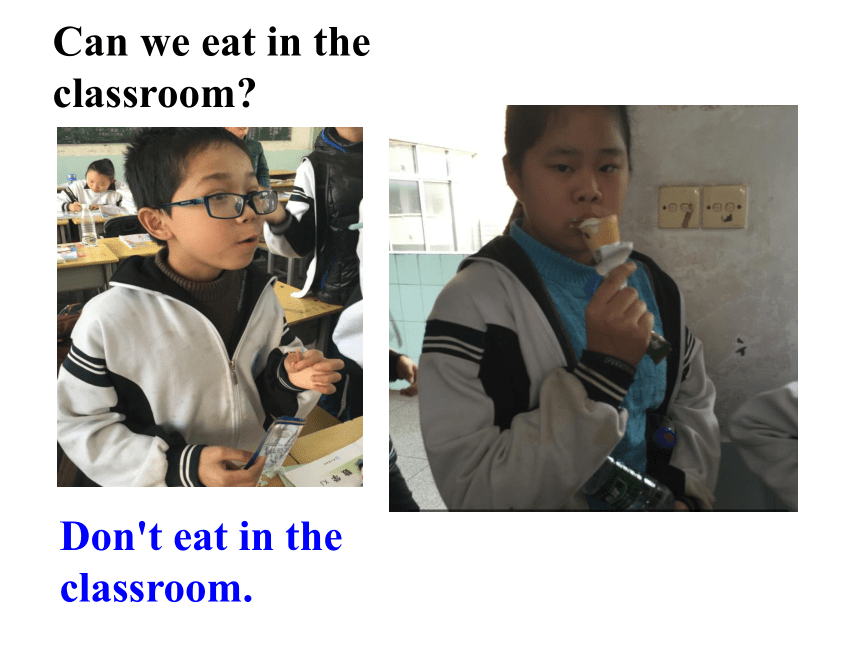
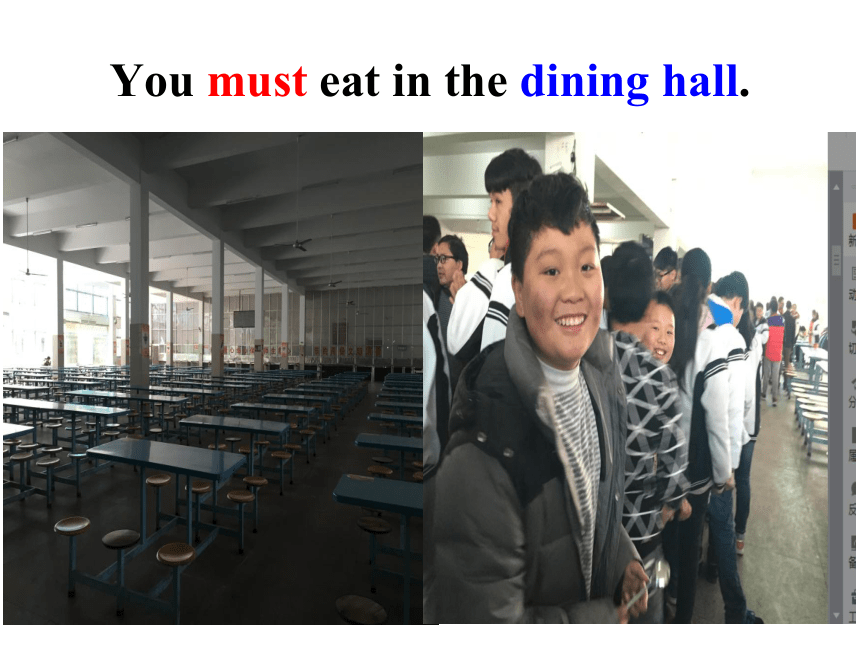
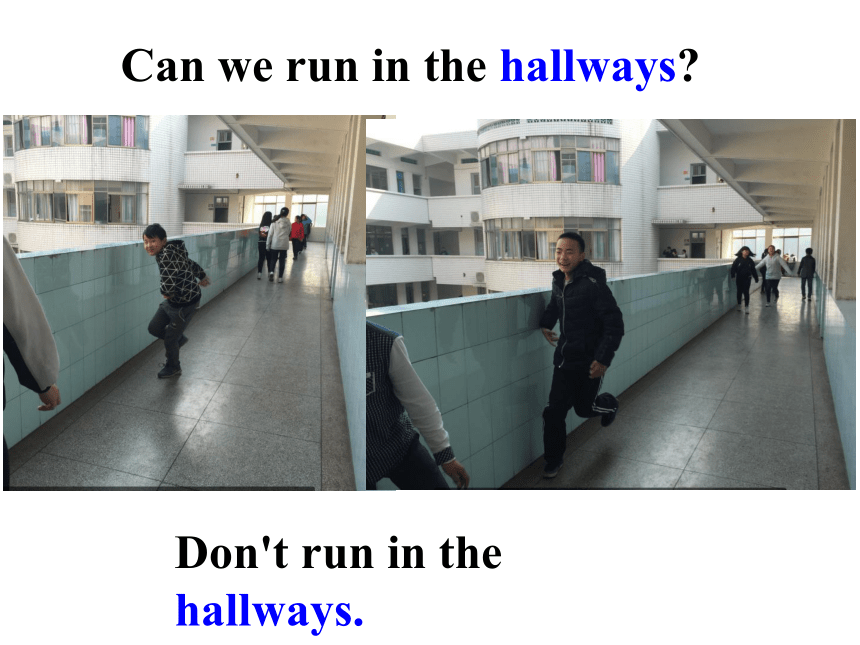
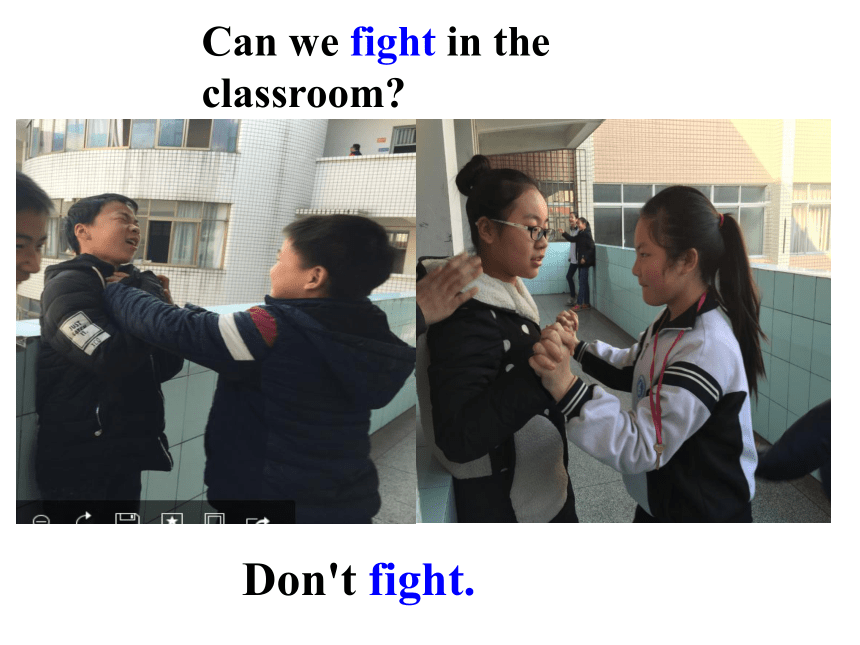
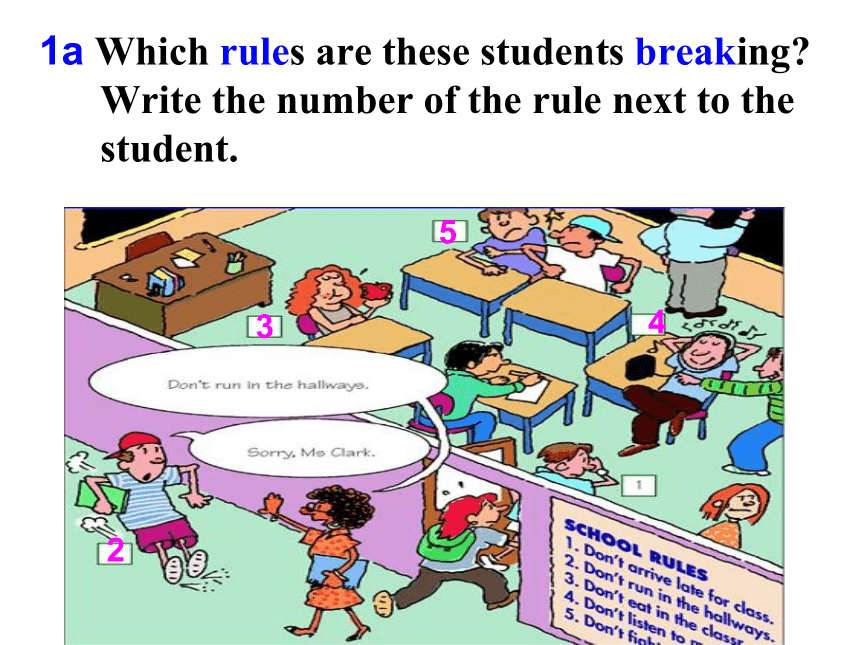
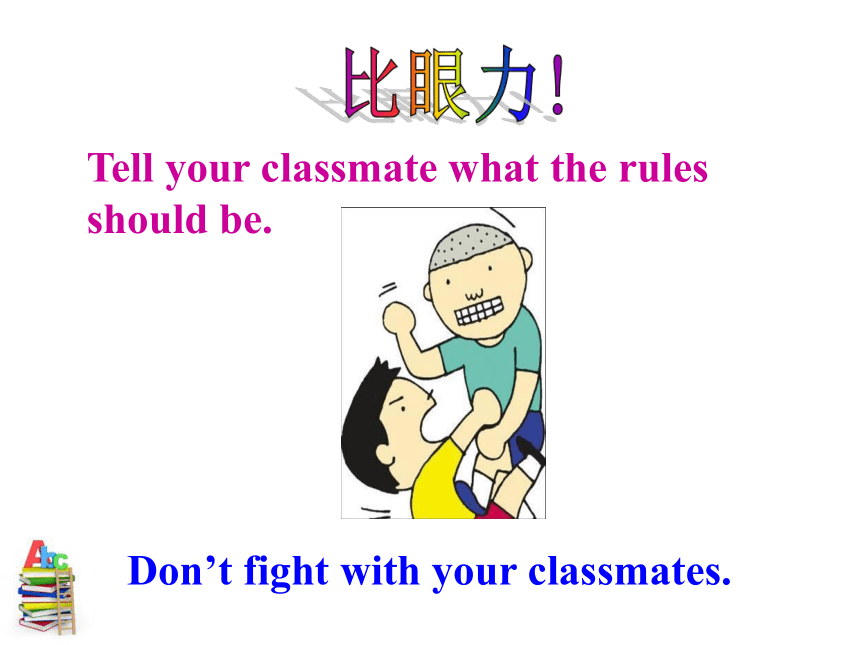
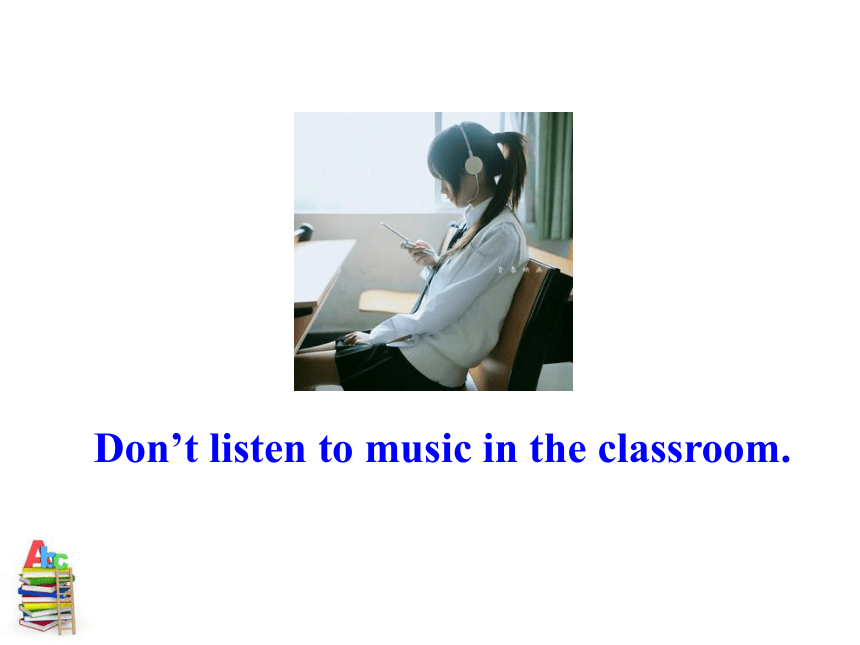
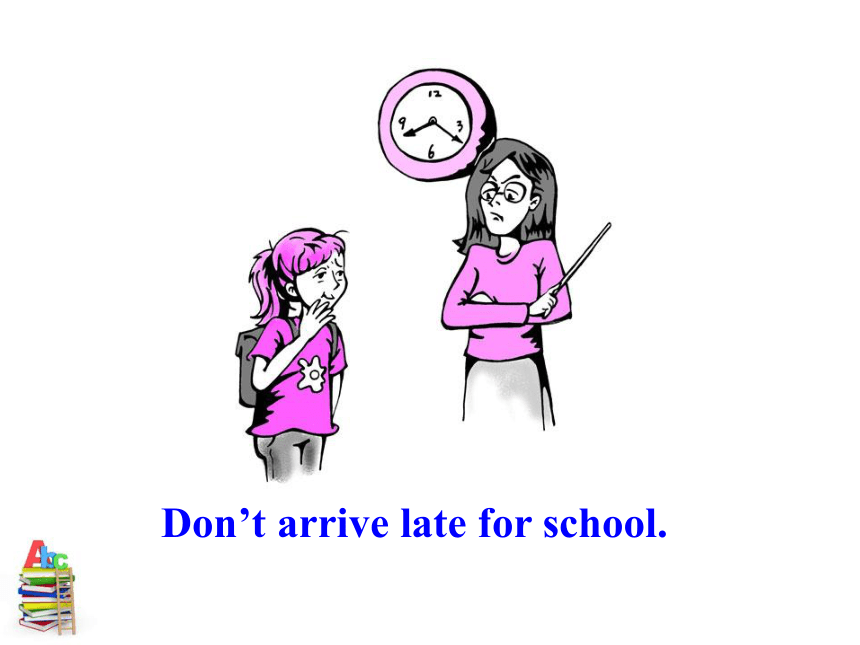
文档简介
课件49张PPT。Don’t eat in class.Unit 4Section A1
1a-2dCan we arrive late for class?Don't arrive late for class.8:15 A.M.You must be on time.7:55 A.MCan we eat in the classroom?Don't eat in the classroom.You must eat in the dining hall.Can we run in the hallways?Don't run in the hallways.Can we fight in the classroom?Don't fight.1a Which rules are these students breaking? Write the number of the rule next to the student.4325比眼力!Don’t fight with your classmates.Tell your classmate what the rules should be. Don’t listen to music in the classroom.Don’t arrive late for school.Don’t eat in the classroom. You must eat in the dining hall.Don’t run in the hallways. Don't sleep in classYou must wear the school uniform.1. Don’t arrive late for class. You must be
on time.
2. Don’t run in the hallways.
3. Don’t eat in the classroom. You must
eat in the dining hall.
4. Don’t listen to music in class.
5. Don’t fight.RulesPeter ______ Amy ______ Mike ______Listening1b Listen. What rules are these students breaking? Write the numbers after the names.234Well, we can’t arrive late for class. We must be on time.1c Student A is a new student. Student B tells Student A about the rules above. What are the rules?PairworkDon’t run in the hallways.What are the other rules?Make rulesclassroomlibrarydining hallDon't ....
You must...
You can...
You can't...music playeruniforms
n. 制服wear a hat
戴帽子sorry adj. 对不起outside adv. 外出arrive v. 到达1. ___ listen to music in the classroom or
hallways
2. ___ listen to music in music room
3. ___ listen to music outside
4. ___ eat in the classroom2a Listen check (√) the activities
Alan and Cindy talk about.Listening√√√√5. ___ eat in the dinning hall
6. ___ eat outside
7. ___ wear a hat
8. ___ fight √√√listen to music in the classroom or hallways
listen to music in music room
listen to music outside
eat in the classroom
eat in the dining hall
eat outside
wear a hat
fight can can’t
can can’t
can can’t
can can’t
can can’t
can can’t
can can’t
can can’t2b Listen again. Can Alan and Cindy do these activities? Circle can or can’t above.Well, we can’t listen to music in the classroom or hallways.
But we can listen to music in music room.2c Student A is Alan and Student B is Cindy. Talk about the rules in 2a. What are the school rules, Alan?We can’t eat in the classroom, but we can eat in the dining hall.Uh-huh.Pair workNo, you can’t. What else? Oh, you can’t fight with your classmates. That makes the teachers really unhappy.
Oh, can we wear a hat in class?I see. write or draw on the desks
use mobile phones
sit on the desks
speak or laugh loudly in the classroom
run around in the classroomCan or can’tOur Class RulesNo, you can’t. Can we write or draw on the desks?Right. We can’t write or draw on the desks, but we can write or draw on paper or in notebooks.1. Is John new at school?
___________
2. Are there many rules at school?
______________2d Read the conversation in 2d and answer the questions.Yes, he is.Yes, there are.3. Can he bright music players to school?
_______________
4. Do they have to always wear the school uniform?
_______________No, he can’t. Yes, they do.2d Role-play the conversation.Role-play1) arrive 后面可以不跟到达的地点。
e.g. Don’t arrive late for school.
不要上学迟到。1. arrive v. 到达= get (to)Language pointse.g. They arrived in Beijing at six. 他们六点钟到的北京。
We usually arrive at the village in
the morning. 我们通常在早上到那个小村庄。2) arrive后面也可以跟到达的地点。但后面必须要跟介词in (大地方)或 at(小地方)。1. My mother usually get ___ school at 7:40 in the morning.
2. When do you usually arrive ____ the bus station?
3. Jenny’s uncle usually arrives ___ Shanghai in the evening. 选词填空: in, at, totoin at1) listen v. 听;用来提醒某人注意,后面不跟事物。
e.g. Listen! Who’s singing in the
classroom?
听!谁在教室里唱歌?
2) 如果后面跟要听的事物,应跟介词to再跟事物。
e.g. Listen to our teacher carefully.
认真听老师讲。2. listen 的用法:3. fight 打架,争吵1) 作动词用
e.g. Jack never fights with his brother. 杰克从不和他的弟弟打架。
2) 作名词,意为“打架;争吵”; 常用词组have a fight“打架;吵架”
e.g. Did you have a fight with her? 你和她吵过架吗?4. wear v. 意为“穿、戴”
e.g. My aunt wears a blue skirt and a white T-shirt. 我姑姑穿着蓝色的裙子,白色的T恤。
Does he wear glasses? 他戴眼镜吗? 5. have to与must
have?to着重于客观的需要,含有“不得不”的客观强制性;must着重于主观上自己认为有义务、有必要。如:
She has to clean the room every week.
她每周都得打扫房间。
I must go now.
我现在必须走。含有have to的句子变一般疑问句或否定句时要借助助动词do / don’t或does / doesn’t;而含有must的句子变一般疑问句是直接将must提前至句首,变否定句是在must后加not。如:
He doesn’t have to do it.
他不必做那件事。
He mustn’t do it.
他不许做那件事。Does?he?have?to?do?it??
他不得不做那件事吗????
Must he do his homework?
他必须做他的作业吗?在否定句中,don’t / doesn’t have?to表示“没有必要”,must not / mustn’t表示“不允许”。如:
You?don’t?have?to?go?there.?
你不必去那儿。???
You must not / mustn’t go there.
你不许去那儿。练一练:用have to, must 填空。
1. It’s cold outside. We ______ stay at
home.
2. We ____ be good with our parents.have tomust根据要求完成下列各题。
1. He has to wear the school uniform at school. (改为一般疑问句)
_____ he ________ wear the school uniform at school?
2. They have to do too much homework every day.? (改为否定句)
They ______________ do too much homework every day. Doeshave to?don’t have to?3. We must finish our work now. (改为一般疑问句)
______ we ______ our work now?Mustfinish不要在上课时听音乐。
_________________________
2. 我们必须准时。
_________________________
3. 我们能把音乐播放器带到学校里来吗?
___________________________________
在图书馆里我们必须保持安静。
_____________________________
不要在楼道里跑 。
_____________________________Don’t listen to music in class.We must be on time.将下列句子译成英语。ExercisesCan we bring the music player to school?We must keep quiet in the library.Don’t run in the hallways.提示:
1. 上学不要迟到 2. 按时上课
3. 穿校服 4. 不在教室里吃东西
5. 不要在教室里戴帽子
6. 在餐厅吃东西Write the rules in your school.Follow the rules at school!
1a-2dCan we arrive late for class?Don't arrive late for class.8:15 A.M.You must be on time.7:55 A.MCan we eat in the classroom?Don't eat in the classroom.You must eat in the dining hall.Can we run in the hallways?Don't run in the hallways.Can we fight in the classroom?Don't fight.1a Which rules are these students breaking? Write the number of the rule next to the student.4325比眼力!Don’t fight with your classmates.Tell your classmate what the rules should be. Don’t listen to music in the classroom.Don’t arrive late for school.Don’t eat in the classroom. You must eat in the dining hall.Don’t run in the hallways. Don't sleep in classYou must wear the school uniform.1. Don’t arrive late for class. You must be
on time.
2. Don’t run in the hallways.
3. Don’t eat in the classroom. You must
eat in the dining hall.
4. Don’t listen to music in class.
5. Don’t fight.RulesPeter ______ Amy ______ Mike ______Listening1b Listen. What rules are these students breaking? Write the numbers after the names.234Well, we can’t arrive late for class. We must be on time.1c Student A is a new student. Student B tells Student A about the rules above. What are the rules?PairworkDon’t run in the hallways.What are the other rules?Make rulesclassroomlibrarydining hallDon't ....
You must...
You can...
You can't...music playeruniforms
n. 制服wear a hat
戴帽子sorry adj. 对不起outside adv. 外出arrive v. 到达1. ___ listen to music in the classroom or
hallways
2. ___ listen to music in music room
3. ___ listen to music outside
4. ___ eat in the classroom2a Listen check (√) the activities
Alan and Cindy talk about.Listening√√√√5. ___ eat in the dinning hall
6. ___ eat outside
7. ___ wear a hat
8. ___ fight √√√listen to music in the classroom or hallways
listen to music in music room
listen to music outside
eat in the classroom
eat in the dining hall
eat outside
wear a hat
fight can can’t
can can’t
can can’t
can can’t
can can’t
can can’t
can can’t
can can’t2b Listen again. Can Alan and Cindy do these activities? Circle can or can’t above.Well, we can’t listen to music in the classroom or hallways.
But we can listen to music in music room.2c Student A is Alan and Student B is Cindy. Talk about the rules in 2a. What are the school rules, Alan?We can’t eat in the classroom, but we can eat in the dining hall.Uh-huh.Pair workNo, you can’t. What else? Oh, you can’t fight with your classmates. That makes the teachers really unhappy.
Oh, can we wear a hat in class?I see. write or draw on the desks
use mobile phones
sit on the desks
speak or laugh loudly in the classroom
run around in the classroomCan or can’tOur Class RulesNo, you can’t. Can we write or draw on the desks?Right. We can’t write or draw on the desks, but we can write or draw on paper or in notebooks.1. Is John new at school?
___________
2. Are there many rules at school?
______________2d Read the conversation in 2d and answer the questions.Yes, he is.Yes, there are.3. Can he bright music players to school?
_______________
4. Do they have to always wear the school uniform?
_______________No, he can’t. Yes, they do.2d Role-play the conversation.Role-play1) arrive 后面可以不跟到达的地点。
e.g. Don’t arrive late for school.
不要上学迟到。1. arrive v. 到达= get (to)Language pointse.g. They arrived in Beijing at six. 他们六点钟到的北京。
We usually arrive at the village in
the morning. 我们通常在早上到那个小村庄。2) arrive后面也可以跟到达的地点。但后面必须要跟介词in (大地方)或 at(小地方)。1. My mother usually get ___ school at 7:40 in the morning.
2. When do you usually arrive ____ the bus station?
3. Jenny’s uncle usually arrives ___ Shanghai in the evening. 选词填空: in, at, totoin at1) listen v. 听;用来提醒某人注意,后面不跟事物。
e.g. Listen! Who’s singing in the
classroom?
听!谁在教室里唱歌?
2) 如果后面跟要听的事物,应跟介词to再跟事物。
e.g. Listen to our teacher carefully.
认真听老师讲。2. listen 的用法:3. fight 打架,争吵1) 作动词用
e.g. Jack never fights with his brother. 杰克从不和他的弟弟打架。
2) 作名词,意为“打架;争吵”; 常用词组have a fight“打架;吵架”
e.g. Did you have a fight with her? 你和她吵过架吗?4. wear v. 意为“穿、戴”
e.g. My aunt wears a blue skirt and a white T-shirt. 我姑姑穿着蓝色的裙子,白色的T恤。
Does he wear glasses? 他戴眼镜吗? 5. have to与must
have?to着重于客观的需要,含有“不得不”的客观强制性;must着重于主观上自己认为有义务、有必要。如:
She has to clean the room every week.
她每周都得打扫房间。
I must go now.
我现在必须走。含有have to的句子变一般疑问句或否定句时要借助助动词do / don’t或does / doesn’t;而含有must的句子变一般疑问句是直接将must提前至句首,变否定句是在must后加not。如:
He doesn’t have to do it.
他不必做那件事。
He mustn’t do it.
他不许做那件事。Does?he?have?to?do?it??
他不得不做那件事吗????
Must he do his homework?
他必须做他的作业吗?在否定句中,don’t / doesn’t have?to表示“没有必要”,must not / mustn’t表示“不允许”。如:
You?don’t?have?to?go?there.?
你不必去那儿。???
You must not / mustn’t go there.
你不许去那儿。练一练:用have to, must 填空。
1. It’s cold outside. We ______ stay at
home.
2. We ____ be good with our parents.have tomust根据要求完成下列各题。
1. He has to wear the school uniform at school. (改为一般疑问句)
_____ he ________ wear the school uniform at school?
2. They have to do too much homework every day.? (改为否定句)
They ______________ do too much homework every day. Doeshave to?don’t have to?3. We must finish our work now. (改为一般疑问句)
______ we ______ our work now?Mustfinish不要在上课时听音乐。
_________________________
2. 我们必须准时。
_________________________
3. 我们能把音乐播放器带到学校里来吗?
___________________________________
在图书馆里我们必须保持安静。
_____________________________
不要在楼道里跑 。
_____________________________Don’t listen to music in class.We must be on time.将下列句子译成英语。ExercisesCan we bring the music player to school?We must keep quiet in the library.Don’t run in the hallways.提示:
1. 上学不要迟到 2. 按时上课
3. 穿校服 4. 不在教室里吃东西
5. 不要在教室里戴帽子
6. 在餐厅吃东西Write the rules in your school.Follow the rules at school!
同课章节目录
- Unit 1 Can you play the guitar?
- Section A
- Section B
- Unit 2 What time do you go to school?
- Section A
- Section B
- Unit 3 How do you get to school?
- Section A
- Section B
- Unit 4 Don't eat in class.
- Section A
- Section B
- Unit 5 Why do you like pandas?
- Section A
- Section B
- Unit 6 I'm watching TV.
- Section A
- Section B
- Review of Units 1-6
- Unit 7 It's raining!
- Section A
- Section B
- Unit 8 Is there a post office near here?
- Section A
- Section B
- Unit 9 What does he look like?
- Section A
- Section B
- Unit 10 I'd like some noodles.
- Section A
- Section B
- Unit 11 How was your school trip?
- Section A
- Section B
- Unit 12 What did you do last weekend?
- Section A
- Section B
